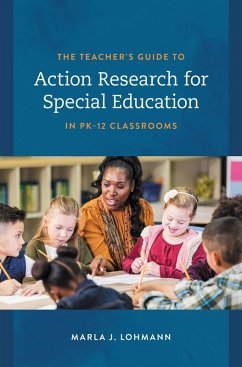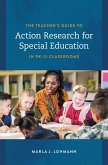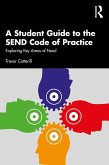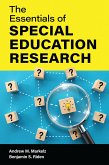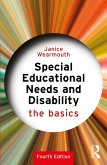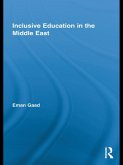Marla J. Lohmann
The Teacher's Guide to Action Research for Special Education in PK-12 Classrooms (eBook, PDF)
18,95 €
18,95 €
inkl. MwSt.
Sofort per Download lieferbar

9 °P sammeln
18,95 €
Als Download kaufen

18,95 €
inkl. MwSt.
Sofort per Download lieferbar

9 °P sammeln
Jetzt verschenken
Alle Infos zum eBook verschenken
18,95 €
inkl. MwSt.
Sofort per Download lieferbar
Alle Infos zum eBook verschenken

9 °P sammeln
Marla J. Lohmann
The Teacher's Guide to Action Research for Special Education in PK-12 Classrooms (eBook, PDF)
- Format: PDF
- Merkliste
- Auf die Merkliste
- Bewerten Bewerten
- Teilen
- Produkt teilen
- Produkterinnerung
- Produkterinnerung

Bitte loggen Sie sich zunächst in Ihr Kundenkonto ein oder registrieren Sie sich bei
bücher.de, um das eBook-Abo tolino select nutzen zu können.
Hier können Sie sich einloggen
Hier können Sie sich einloggen
Sie sind bereits eingeloggt. Klicken Sie auf 2. tolino select Abo, um fortzufahren.

Bitte loggen Sie sich zunächst in Ihr Kundenkonto ein oder registrieren Sie sich bei bücher.de, um das eBook-Abo tolino select nutzen zu können.
The use of data-based decision making is critical in any classroom, but especially in special education settings. The Teacher's Guide to Action Research for Special Education in PK-12 Classrooms describes the basic concepts of action research and how this process can support student success in the classroom and beyond. This practical, approachable, and concise guide provides case studies, vignettes, student learning objectives, and review exercises to help teachers understand how to effectively use the action research process to identify and evaluate evidence-based interventions, with explicit…mehr
- Geräte: PC
- mit Kopierschutz
- eBook Hilfe
- Größe: 3.29MB
Andere Kunden interessierten sich auch für
![The Teacher's Guide to Action Research for Special Education in PK-12 Classrooms (eBook, ePUB) The Teacher's Guide to Action Research for Special Education in PK-12 Classrooms (eBook, ePUB)]() Marla J. LohmannThe Teacher's Guide to Action Research for Special Education in PK-12 Classrooms (eBook, ePUB)18,95 €
Marla J. LohmannThe Teacher's Guide to Action Research for Special Education in PK-12 Classrooms (eBook, ePUB)18,95 €![Developing Educationally Meaningful and Legally Sound IEPs (eBook, PDF) Developing Educationally Meaningful and Legally Sound IEPs (eBook, PDF)]() Mitchell L. YellDeveloping Educationally Meaningful and Legally Sound IEPs (eBook, PDF)24,95 €
Mitchell L. YellDeveloping Educationally Meaningful and Legally Sound IEPs (eBook, PDF)24,95 €![A Student Guide to the SEND Code of Practice (eBook, PDF) A Student Guide to the SEND Code of Practice (eBook, PDF)]() Trevor CotterillA Student Guide to the SEND Code of Practice (eBook, PDF)29,95 €
Trevor CotterillA Student Guide to the SEND Code of Practice (eBook, PDF)29,95 €![The Essentials of Special Education Research (eBook, PDF) The Essentials of Special Education Research (eBook, PDF)]() Andrew M. MarkelzThe Essentials of Special Education Research (eBook, PDF)18,95 €
Andrew M. MarkelzThe Essentials of Special Education Research (eBook, PDF)18,95 €![The Politics of Race, Class and Special Education (eBook, PDF) The Politics of Race, Class and Special Education (eBook, PDF)]() Sally TomlinsonThe Politics of Race, Class and Special Education (eBook, PDF)57,95 €
Sally TomlinsonThe Politics of Race, Class and Special Education (eBook, PDF)57,95 €![Special Educational Needs and Disability (eBook, PDF) Special Educational Needs and Disability (eBook, PDF)]() Janice WearmouthSpecial Educational Needs and Disability (eBook, PDF)21,95 €
Janice WearmouthSpecial Educational Needs and Disability (eBook, PDF)21,95 €![Inclusive Education in the Middle East (eBook, PDF) Inclusive Education in the Middle East (eBook, PDF)]() Eman GaadInclusive Education in the Middle East (eBook, PDF)53,95 €
Eman GaadInclusive Education in the Middle East (eBook, PDF)53,95 €-
-
-
The use of data-based decision making is critical in any classroom, but especially in special education settings. The Teacher's Guide to Action Research for Special Education in PK-12 Classrooms describes the basic concepts of action research and how this process can support student success in the classroom and beyond. This practical, approachable, and concise guide provides case studies, vignettes, student learning objectives, and review exercises to help teachers understand how to effectively use the action research process to identify and evaluate evidence-based interventions, with explicit connections to legally mandated IEP planning, implementation, and evaluation processes.
Produktdetails
- Produktdetails
- Verlag: Bloomsbury eBooks US
- Seitenzahl: 154
- Erscheinungstermin: 9. Januar 2023
- Englisch
- ISBN-13: 9798765181249
- Artikelnr.: 74843438
- Verlag: Bloomsbury eBooks US
- Seitenzahl: 154
- Erscheinungstermin: 9. Januar 2023
- Englisch
- ISBN-13: 9798765181249
- Artikelnr.: 74843438
- Herstellerkennzeichnung Die Herstellerinformationen sind derzeit nicht verfügbar.
Marla J. Lohmann is an Associate Professor and Program Director of Special Education and Alternative Licensure at Colorado Christian University. She teaches fully online undergraduate and graduate general and special education coursework and currently teaches about 36 credit hours per academic year. Dr. Lohmann is an active member of the Council for Exceptional Children Teacher Education Division (TED) at both the state and international levels. She is passionate about offering high quality pre-service teacher preparation and ongoing training for in-service teachers in the virtual university classroom. Dr. Lohmann has taught more than 130 asynchronous online teacher education courses and was awarded the 2018 CCU Colorado Christian University Curriculum & Instruction Division Outstanding Faculty Member Award based on student nomination and feedback.
List of Figures, Tables, and Textboxes
Acknowledgments
1 What Is Special Education Action Research?
Student Learning Objectives
What Is Research?
Action Research in Daily Life
The Action Research Process
Action Research in the IEP Process
Traditional Research versus Action Research
Quantitative Research, Qualitative Research, & Mixed Methods Research
Why Should I Do Action Research?
Conclusion
Review Questions and Exercises
2 Identifying Classroom Learning Challenges and Collecting Baseline Data
Student Learning Objectives
Data-Driven Decision-Making
Defining Learning or Behavior Challenge
Collecting Baseline Data
Assessment Data
Work Samples
Observations
Surveys/Questionnaires
Checklists
Rating Scales
Interviews
The Challenge with Only Relying on Formal Assessments 3
Data Literacy
Additional Data Collection Considerations
Forming a Problem Statement
Conclusion
Review Questions and Exercises
3 Identifying Potential Evidence-Based Interventions
Student Learning Objectives
Evidence-Based Practices
Locating EBPs
Finding EBPs Without Access to a University Database
Determining the Appropriateness of an EBP for your Student
Designing an Intervention Plan
Conclusion
Review Questions and Exercises
4 Implementing an Evidence-Based Intervention
Student Learning Objectives
Planning for the Intervention
IRB Applications and Approval
Implementing the Intervention
Implementation Fidelity
Conclusion
Review Questions and Exercises
5 Evaluating the Effectiveness of the Intervention
Student Learning Objectives
Formative Evaluation
Analyzing the Formative Data
Determining Effectiveness of Intervention
Seeking Stakeholder Input When Looking at Data
Conclusion
Review Questions and Exercises
6 Sharing Your Research
Student Learning Objectives
Sharing Data with Colleagues
Rationale for Sharing Data with Education Community
Sharing your Research with the Education Community Through Presentations
Sharing your Research with the Education Community Through an Action
Research Journal Article
Sharing your Research with the Education Community Through a Journal
Article
Conclusion
Review Questions and Exercises
7 Conclusion
Student Learning Objectives
A synopsis of the Action Research Process
Action Research and the Individualized Education Program
Considerations for Data in Special Education
Moving Forward
Review Questions and exercises
Appendix A: Case Studies: Sample Action Research Projects
Case Study: Pierre
Case Study: Jack
Case Study: Alana
Appendix B: Case Studies for Student Practice
Case Study 1: Communication Delay in Preschool
Case Study 2: self-Injury Behavior in Sixth Grade
Case Study 3: Hyperactivity in First Grade
Case Study 4: Paraprofessional Training
Case Study 5: elopement in Fourth Grade
Case Study 6: transition Goal for High school student
Case Study 7: Cheating Behavior in Middle school
Case Study 8: Writing Disability in third Grade
Case Study 9: Math Delay in second Grade
Case Study 10: Biting Behavior in Kindergarten
References
Index
About the Author
Acknowledgments
1 What Is Special Education Action Research?
Student Learning Objectives
What Is Research?
Action Research in Daily Life
The Action Research Process
Action Research in the IEP Process
Traditional Research versus Action Research
Quantitative Research, Qualitative Research, & Mixed Methods Research
Why Should I Do Action Research?
Conclusion
Review Questions and Exercises
2 Identifying Classroom Learning Challenges and Collecting Baseline Data
Student Learning Objectives
Data-Driven Decision-Making
Defining Learning or Behavior Challenge
Collecting Baseline Data
Assessment Data
Work Samples
Observations
Surveys/Questionnaires
Checklists
Rating Scales
Interviews
The Challenge with Only Relying on Formal Assessments 3
Data Literacy
Additional Data Collection Considerations
Forming a Problem Statement
Conclusion
Review Questions and Exercises
3 Identifying Potential Evidence-Based Interventions
Student Learning Objectives
Evidence-Based Practices
Locating EBPs
Finding EBPs Without Access to a University Database
Determining the Appropriateness of an EBP for your Student
Designing an Intervention Plan
Conclusion
Review Questions and Exercises
4 Implementing an Evidence-Based Intervention
Student Learning Objectives
Planning for the Intervention
IRB Applications and Approval
Implementing the Intervention
Implementation Fidelity
Conclusion
Review Questions and Exercises
5 Evaluating the Effectiveness of the Intervention
Student Learning Objectives
Formative Evaluation
Analyzing the Formative Data
Determining Effectiveness of Intervention
Seeking Stakeholder Input When Looking at Data
Conclusion
Review Questions and Exercises
6 Sharing Your Research
Student Learning Objectives
Sharing Data with Colleagues
Rationale for Sharing Data with Education Community
Sharing your Research with the Education Community Through Presentations
Sharing your Research with the Education Community Through an Action
Research Journal Article
Sharing your Research with the Education Community Through a Journal
Article
Conclusion
Review Questions and Exercises
7 Conclusion
Student Learning Objectives
A synopsis of the Action Research Process
Action Research and the Individualized Education Program
Considerations for Data in Special Education
Moving Forward
Review Questions and exercises
Appendix A: Case Studies: Sample Action Research Projects
Case Study: Pierre
Case Study: Jack
Case Study: Alana
Appendix B: Case Studies for Student Practice
Case Study 1: Communication Delay in Preschool
Case Study 2: self-Injury Behavior in Sixth Grade
Case Study 3: Hyperactivity in First Grade
Case Study 4: Paraprofessional Training
Case Study 5: elopement in Fourth Grade
Case Study 6: transition Goal for High school student
Case Study 7: Cheating Behavior in Middle school
Case Study 8: Writing Disability in third Grade
Case Study 9: Math Delay in second Grade
Case Study 10: Biting Behavior in Kindergarten
References
Index
About the Author
List of Figures, Tables, and Textboxes
Acknowledgments
1 What Is Special Education Action Research?
Student Learning Objectives
What Is Research?
Action Research in Daily Life
The Action Research Process
Action Research in the IEP Process
Traditional Research versus Action Research
Quantitative Research, Qualitative Research, & Mixed Methods Research
Why Should I Do Action Research?
Conclusion
Review Questions and Exercises
2 Identifying Classroom Learning Challenges and Collecting Baseline Data
Student Learning Objectives
Data-Driven Decision-Making
Defining Learning or Behavior Challenge
Collecting Baseline Data
Assessment Data
Work Samples
Observations
Surveys/Questionnaires
Checklists
Rating Scales
Interviews
The Challenge with Only Relying on Formal Assessments 3
Data Literacy
Additional Data Collection Considerations
Forming a Problem Statement
Conclusion
Review Questions and Exercises
3 Identifying Potential Evidence-Based Interventions
Student Learning Objectives
Evidence-Based Practices
Locating EBPs
Finding EBPs Without Access to a University Database
Determining the Appropriateness of an EBP for your Student
Designing an Intervention Plan
Conclusion
Review Questions and Exercises
4 Implementing an Evidence-Based Intervention
Student Learning Objectives
Planning for the Intervention
IRB Applications and Approval
Implementing the Intervention
Implementation Fidelity
Conclusion
Review Questions and Exercises
5 Evaluating the Effectiveness of the Intervention
Student Learning Objectives
Formative Evaluation
Analyzing the Formative Data
Determining Effectiveness of Intervention
Seeking Stakeholder Input When Looking at Data
Conclusion
Review Questions and Exercises
6 Sharing Your Research
Student Learning Objectives
Sharing Data with Colleagues
Rationale for Sharing Data with Education Community
Sharing your Research with the Education Community Through Presentations
Sharing your Research with the Education Community Through an Action
Research Journal Article
Sharing your Research with the Education Community Through a Journal
Article
Conclusion
Review Questions and Exercises
7 Conclusion
Student Learning Objectives
A synopsis of the Action Research Process
Action Research and the Individualized Education Program
Considerations for Data in Special Education
Moving Forward
Review Questions and exercises
Appendix A: Case Studies: Sample Action Research Projects
Case Study: Pierre
Case Study: Jack
Case Study: Alana
Appendix B: Case Studies for Student Practice
Case Study 1: Communication Delay in Preschool
Case Study 2: self-Injury Behavior in Sixth Grade
Case Study 3: Hyperactivity in First Grade
Case Study 4: Paraprofessional Training
Case Study 5: elopement in Fourth Grade
Case Study 6: transition Goal for High school student
Case Study 7: Cheating Behavior in Middle school
Case Study 8: Writing Disability in third Grade
Case Study 9: Math Delay in second Grade
Case Study 10: Biting Behavior in Kindergarten
References
Index
About the Author
Acknowledgments
1 What Is Special Education Action Research?
Student Learning Objectives
What Is Research?
Action Research in Daily Life
The Action Research Process
Action Research in the IEP Process
Traditional Research versus Action Research
Quantitative Research, Qualitative Research, & Mixed Methods Research
Why Should I Do Action Research?
Conclusion
Review Questions and Exercises
2 Identifying Classroom Learning Challenges and Collecting Baseline Data
Student Learning Objectives
Data-Driven Decision-Making
Defining Learning or Behavior Challenge
Collecting Baseline Data
Assessment Data
Work Samples
Observations
Surveys/Questionnaires
Checklists
Rating Scales
Interviews
The Challenge with Only Relying on Formal Assessments 3
Data Literacy
Additional Data Collection Considerations
Forming a Problem Statement
Conclusion
Review Questions and Exercises
3 Identifying Potential Evidence-Based Interventions
Student Learning Objectives
Evidence-Based Practices
Locating EBPs
Finding EBPs Without Access to a University Database
Determining the Appropriateness of an EBP for your Student
Designing an Intervention Plan
Conclusion
Review Questions and Exercises
4 Implementing an Evidence-Based Intervention
Student Learning Objectives
Planning for the Intervention
IRB Applications and Approval
Implementing the Intervention
Implementation Fidelity
Conclusion
Review Questions and Exercises
5 Evaluating the Effectiveness of the Intervention
Student Learning Objectives
Formative Evaluation
Analyzing the Formative Data
Determining Effectiveness of Intervention
Seeking Stakeholder Input When Looking at Data
Conclusion
Review Questions and Exercises
6 Sharing Your Research
Student Learning Objectives
Sharing Data with Colleagues
Rationale for Sharing Data with Education Community
Sharing your Research with the Education Community Through Presentations
Sharing your Research with the Education Community Through an Action
Research Journal Article
Sharing your Research with the Education Community Through a Journal
Article
Conclusion
Review Questions and Exercises
7 Conclusion
Student Learning Objectives
A synopsis of the Action Research Process
Action Research and the Individualized Education Program
Considerations for Data in Special Education
Moving Forward
Review Questions and exercises
Appendix A: Case Studies: Sample Action Research Projects
Case Study: Pierre
Case Study: Jack
Case Study: Alana
Appendix B: Case Studies for Student Practice
Case Study 1: Communication Delay in Preschool
Case Study 2: self-Injury Behavior in Sixth Grade
Case Study 3: Hyperactivity in First Grade
Case Study 4: Paraprofessional Training
Case Study 5: elopement in Fourth Grade
Case Study 6: transition Goal for High school student
Case Study 7: Cheating Behavior in Middle school
Case Study 8: Writing Disability in third Grade
Case Study 9: Math Delay in second Grade
Case Study 10: Biting Behavior in Kindergarten
References
Index
About the Author
